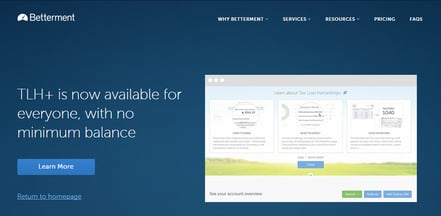Written by: Eric Stahler | Corporate Insight
The brokerage industry is still abuzz from the recent release of Schwab’s Intelligent Portfolios, as competitors search for ways to regain their footing in the rapidly changing marketplace. This past month, in the latest retaliation to Schwab’s entry into the robo-advising sector, Wealthfront and Betterment both introduced tax-loss harvesting services to all account holders at no additional cost. Tax-loss harvesting – the practice of selling a security at a loss to defer capital gain taxes – was traditionally reserved for high-net-worth investors who could afford to pay advisors for the laborious process. In recent years, however, automated investment firms have attempted to reverse the exclusivity of the practice, opening it up to less affluent investors, by computerizing the process with algorithm-based technology. Robo-advising firms aim to revolutionize the brokerage practice, and Betterment and Wealthfront’s recent actions exemplify the larger trends within the industry.

Betterment’s Announcement of New Tax Loss Harvesting+ Program
Betterment and Wealthfront’s tax-loss harvesting services, which are available with no minimum balance, are likely to attract less affluent investors who are eager to boost returns on their portfolios. Previously, the lowest account minimum , maintained by FutureAdvisor, was a hefty $30,000. Both firms claim that their computer-generated solutions, which analyze portfolios on a daily basis for tax saving opportunities, can help clients amass as much as 1-3% in annual returns . However, many in the brokerage industry question the benefits for those with lower account balances. Critics maintain that tax-loss harvesting will not be as profitable to less wealthy individuals who do not bear as much tax risk. Arguably, tax-loss harvesting has historically been preserved for the ultra-wealthy because the method requires a large investment to generate significant returns.

Wealthfront’s Slideshow Promoting New Tax Loss Harvesting Service
Regardless of the monetary impact that tax-loss services may have on less affluent investors, Betterment and Wealthfront’s actions reveal the shifting landscape of the robo-advising spectrum. Since Schwab sent shockwaves across the industry with the launch of its Intelligent Portfolios, competitors have been on the offensive to undercut the firm’s momentum. However, Intelligent Portfolios does not appear to be losing any steam, having already accumulated over $1.5 billion in assets in just a couple of months. In order to compete with Schwab’s vast resources and established reputation, smaller robo-advisor firms must get creative to maintain the services of existing clients and attract the business of prospects. In this respect, it appears that Betterment and Wealthfront’s expansion of tax-loss harvesting services is, more than anything, a thinly veiled counterattack on Schwab’s spreading industry presence.
It will not end here. The growing competitiveness of the robo-advising industry is forcing firms to increase their offerings continually just to stay afloat. The larger question remains: how far will firms go in the battle to gain investors before overextending themselves or overestimating the benefit of their services to clients? Only time will tell, but if the future of the robo-advising industry becomes a game of “last man standing,” the cards are clearly stacked in Schwab’s favor.

